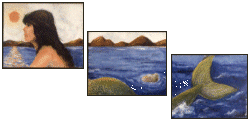|
But
remember always, as I told you at first, that this is all a fairy
tale, and only fun and pretense; and, therefore, you are not to believe
a word of it, even if it is true. According to the Standard Dictionary of Folklore: Mythology and Legend, Merfolk (mermaids and mermen) are supernatural beings who live primarily beneath the sea. It is in Hellenic literature that one finds the first literary description of Merfolk. Ovid writes that mermaids were born from the burning galleys of the Trojans where the timbers turned into the flesh and blood of the 'green daughters of the sea.' There are other versions of their birth: The Irish say that mermaids are old pagan women transformed and banished from the earth by St. Patrick. A Livonian folktale says they are the drowned children of an unknown Pharaoh - having met their doom in the depths of the Red Sea. While the common conception of Merfolk is that they are humans from the waist up, but fishes from the waist down, according to myth that is simply not true. Instead, Merfolk are neither human nor fish, but they are mammals that resemble human/fish combinations. Mermaids are usually depicted as having scaly tails, however, many early descriptions of Merfolk mention their dolphin-like tails. A carving on Puce Church in Gironde, France, shows a young mermaid with two tapering tails instead of legs, similar to the siren image shown on the home page of this website. A mermaid's bewitching voice is said to be able to lure ships onto rocks and men to their deaths. They are beautiful in their appearance and are also musically talented, in both their singing and their playing of musical instruments. Though they spend most of their time underwater, they have been known to assume human form and come ashore to markets and fairs.
Ben-Varry (Manx Mermaids); Catao (Hiligaynon); Caesg (Celtic -- part trout or salmon); Dinny-Mara (Manx Mermen); Havfrue (Scandinavian Mermen); Havmand (Scandinavian Mermaid); Meerfrau; Merefolk (Phillipine Merfolk); Merfish; Merlady; Merman; Merpeople; Muirruhgach (Merrow -- Irish); Merrymaids (Cornish Mermaids); Merwife; Morgens; Neck (Scandinavian fresh and salt water Mermaids); Ningyo (Japanese human-headed fish of immortality); Sea Maids; Sea Maiden; Sea People; Sea Queen; Siren; Tritons; Undersea Folk; Underwater Folk; Water Babies; Water Maid. Names of ancient sea gods: Amphitrite ('The Great Embracer' -- pre-Hellenic sea Goddess); Atargatis (Syrian mermaid Goddess); Lir (Irish sea God); Mami Wata ('Mother Water' -- Nigerian mermaid Goddess); Nereus ('Old Man of the Sea' -- Hellenic sea God); Njord (Norse God of sea travel); Poseidon ('Husband of De' -- Hellenic sea God); Rân ('The Ravisher' -- Norse sea Goddess); Sedna (Inuit sea Goddess). Sources: mermaid.net, The Standard
Dictionary of Folklore: Mythology and Legend. Tales
Links
|
|




